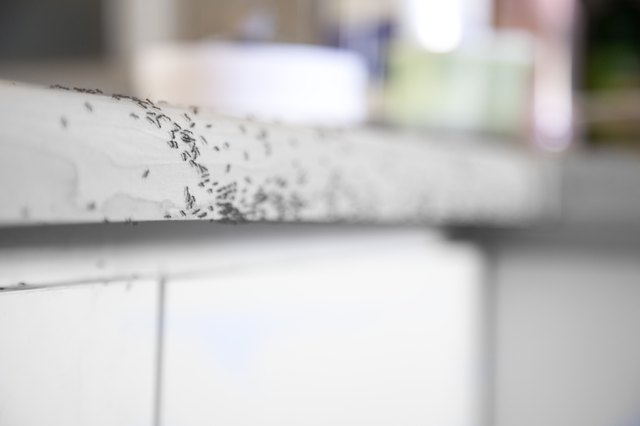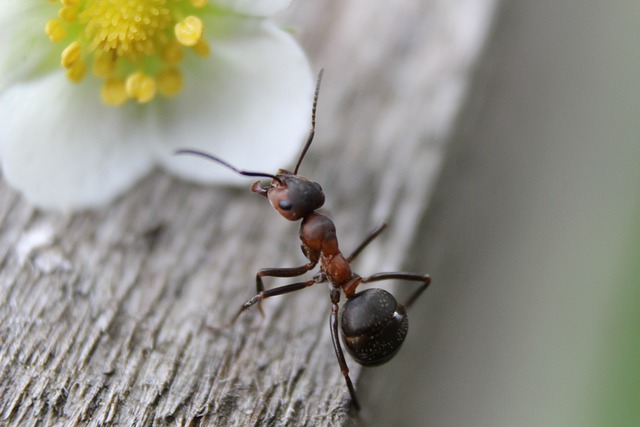Even though there are chemicals to kill ants, they can be very potent and harm more than just the ants. Nevertheless, is there anything you could use in its place that’s in your kitchen cabinet? For instance, can vinegar kill ants?
Does white vinegar kill ants?
Sadly, vinegar does not kill ants, but it does assist in keeping them at bay.
White vinegar cannot kill ants, but the pungent smell may deter them from visiting your garden.
Ants will be seen making a path for themselves. The colony’s other ants can follow these ants and find their food sources because they leave their scent behind. The ants’ trails are broken up by using vinegar, and when they smell it, they become disoriented and flee the area.
For more information, continue reading..
Table of Contents
Do Ants Die From Vinegar?
Online, there are numerous rumors. So before we explain how vinegar really works, let’s get one thing straight:
NOT ANTS ARE KILLED BY VINEGAR.
At least not in the manner that pesticides and insecticides are meant to. As you can see, vinegar lacks the chemical strength to effectively poison ants. However, you can drown ants in vinegar to kill them. But even ordinary water has that capability.
White vinegar only has the ability to repel ants, as we’ve already mentioned. Vinegar can keep ants and even other insects out of specific areas of your house. Additionally, it can serve as a fence around your kitchen or the food you’re storing.
The common ingredient does a great job of preventing ant pheromones, which can cause ants to lose control of their communication and travel routes.
Does Vinegar Attract Or Repel Ants?
Ants detest vinegar, and the smell of it will make them avoid it or make them leave the area permanently. In a straight line, ants march in the direction of the food sources. These pheromones will be disrupted by the vinegar solution, which will cause the ants to scatter. Naturally, ants will attempt to escape the area rather than getting lost.
Why Do Ants Avoid Vinegar?
Pheromone scent trails are used by ants to communicate with one another. They stay away from strong-smelling areas because they are unable to smell their pheromone trails. Since vinegar has a particularly potent smell, it can confuse existing ants as well as confuse those that are already present by interfering with their ability to detect scent trails.
Pour straight white vinegar into a spray bottle and squirt it around food areas where ants are likely to congregate or in entry points where ants enter your home to use vinegar to repel them. When diluted with up to 50% water and up to 10 drops of essential oils, vinegar can be disguised if you can’t stand its strong aroma. Similar to how vinegar works in repelling ants, scents like lavender, orange, peppermint, lemon eucalyptus, or tea tree oil work by preventing ants from smelling their pheromone trails.
You must reapply your homemade ant repellent at least once daily until the ants decide to leave you alone on their own because vinegar and essential oils only last for about a day. See more about Does Salt Kill Ants?
Does Regular Vinegar Kill Ants?
Vinegar comes in a variety of varieties, as you are probably aware, and is sold in stores. Different vinegar solutions have varying strengths. To figure out which of these combinations is efficient and suitable for you, it is best to experiment with a few of them.
Death is extremely unlikely to be the outcome of this experimentation, though. As was already mentioned, vinegar won’t necessarily kill ants, but it will effectively keep them out of your garden. None of them—apple cider, distilled wine, white wine, or balsamic vinegar—will be fatal.
How Long Will Vinegar Repel Ants?
Our first reaction to vinegar’s smell is that it is intolerable. The good news is that even after it has dried, vinegar can still be smelled by ants. Always keep in mind that eliminating an ant infestation with vinegar is not a long-term solution. Spreading the solution over the troubled areas three times a week is reasonable to gradually get rid of the ants.

Why Are Ants Abusive To Vinegar?
Since we already know that the answer to the question “Do ants like vinegar?” is a flat no, let’s look at why they hate it so much.
Essential oils, garlic, lavender, and, yes, vinegar all have strong aromas that ants find repulsive. What may seem innocuous to our noses is actually very irritating to them.
Ant behavior is generally impacted by vinegar. This is due to the pheromone trail left by moving ants. They communicate with one another using these chemical signals. For communication between ants, the pheromone line is necessary.
By virtue of its overpowering smell, vinegar blocks the traces of pheromones. The ants become anxious and move backward a short distance because they won’t be able to detect the trails with their antennae.
What Ants Does Vinegar Kill?
Because of its potent smell, vinegar deters ants. In a nutshell, ants don’t like the smell of vinegar. Ants do not like the strong scent of garlic or lavender, two other popular garden scents.
When applying vinegar, the initial smell may be overpowering for you to handle. Fortunately, ants can still smell it even after it has dried because they have incredibly potent scent receptors.
Use vinegar and water to make a spray, then apply it to the places where ants are most prevalent. You can also use a cloth dipped in a vinegar solution to clean surfaces, pots, garden furniture, and walls.
How To Use Vinegar To Get Rid Of Ants
The vinegar method is a great choice for keeping ants away because it is affordable and widely available. You need to get rid of their scent trail in order to throw ants, and vinegar works well for this.
Vinegar has a variety of other uses besides being used to make a spray. Here are a few options you can try around the garden:
Vinegar And Dish Soap
When dealing with ants, dish soap is well known to be very effective. A spray can be made by combining vinegar and dish soap. This remedy does have one drawback, though, and that is that the mixture can become quite sticky.
Baking Soda And Vinegar
Utilizing baking soda is another natural method for eradicating ants and other insects. In the vicinity of the ant trails, scatter the baking soda. To make baking soda more effective at luring ants, you could also add sugar. The baking soda will be consumed by the ants, who will then perish.
Baking soda’s ability to kill ants and vinegar’s ability to repel them combine to form a potent duo.
Boric Acid And Vinegar
Insects of other species can also be killed by boric acid in addition to ants. As bait for attracting ants, combine some sugar and boric acid. In order to stop the ants from returning, you can disrupt the trails with a vinegar spray.
Vinegar And Lemon Juice
You can include additional potent ingredients to increase the effectiveness of vinegar. Lemon juice can be used to cover up ant odor trails because it has an acidic flavor similar to vinegar. You can incorporate a few drops of lemon juice to your vinegar spray recipe to fortify the mixture.
Vinegar And Orange Peels
You can leave some orange peels that have been soaked in vinegar around your garden or in locations where you frequently see ants. Next, spray the trails with your vinegar solution.
Boiling Water And Vinegar
In your garden, if you carefully follow the ant trail, you will find that it will lead to an ant nest. Naturally, the majority of ants live in this nest, including the queen ant.
Ants will keep reproducing in your garden as long as the queen ants are not eliminated. To cover the ant mound, you can boil water and vinegar together.
You can even reach the ant queen while killing the majority of ants in this manner.
Conclusion
One of the all-natural remedies for eliminating an ant infestation is vinegar. In addition to that, there are a number of other environmentally friendly and cost-effective ways to get rid of ants in your home. A professional pest control expert can also advise you on the best way to get rid of ants if you have infestations inside your home or nearby.
We appreciate you reading.













